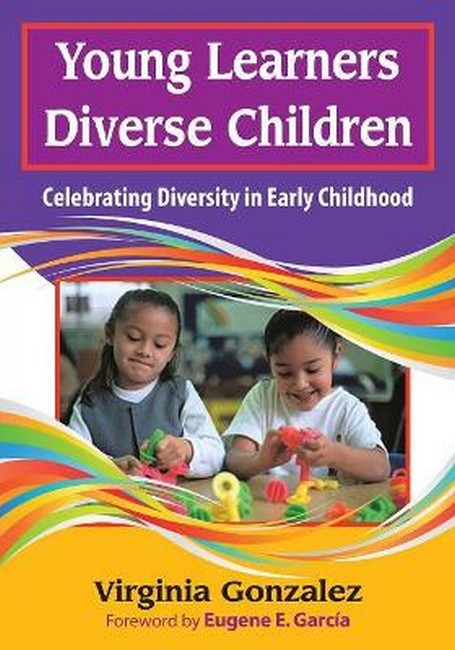Virginia Gonzalez has an interdisciplinary professional and academic background (BA in psychology, 1986, from the Catholic University of Lima-Peru; MA in bilingual special education, 1988, and PhD in educational psychology, 1991, both graduate degrees from The University of Texas at Austin). One of Gonzalez's major areas of expertise is the development of multidisciplinary models explaining sociocultural and linguistic factors influencing alternative assessment, learning and developmental processes, and instructional programs in bilingual/ English-as-a-second-language (ESL), low socioeconomic status, Hispanic children. Gonzalez has conducted multiple research studies that have been published in the form of books and journal articles, have been disseminated at national/international conferences, and have been applied for the assessment and instruction of diverse learners in the public school setting, and of international ESL students in higher education. These studies have generated alternative models and research methodologies, with important educational applications for the assessment and instruction of ethnic minorities. In light of this scholarly work, Gonzalez has been recognized as an outstanding and prolific scholar by major professional organizations in the interdisciplinary fields of second language learning, bilingual education, and cognitive and language development. Among the many recent recognitions that Gonzalez has received for her scholarly and service work are: she was elected to serve as a member of the Executive Special Interest Group (SIG) Committee, and the Program Committee for the American Educational Research Association (AERA) for a three-year term (2007-2010); she was presented with a Service Award by the AERA Bilingual Education Research SIG in April 2007; she served as a chair and discussant for an Invited Presidential Symposium, entitled "Socio-Historical Factors Affecting ESL US Immigrant Public Schools Students' Academic Achievement," presented at AERA 2008 Annual Meeting in New York City; and she was selected by the Council for International Exchange of Scholars (CIES) as a recipient for a Fulbright Senior Specialist Grant with the University of Costa Rica, December 2008.
Request Academic Copy
Please copy the ISBN for submitting review copy form
Description
Lists of Figures and Tables Foreword by Eugene E. Garcia Preface: A Letter to the Reader Acknowledgments About the Author Part I. Ethnic-Educator Philosophical and Theoretical Framework 1. The Ethnic-Educator Philosophy Examples of Principle 1 Examples of Principle 2 Examples of Principle 3 Examples of Principle 4 2. The Ethnic-Educator Pedagogical Model How Teachers' Personalities Affect Their Assessment and Instructional Decisions A Socioconstructivistic Pedagogical Model Supporting the Ethnic-Educator Approach The Four Pedagogical Principles for Learning and Academic Achievement Part II. Educational Applications of the Ethnic-Educator Approach 3. Teaching Strategies Strategies Supporting the Ethnic-Educator Approach First Cluster of Pedagogical Strategies: Thematic Curriculums First Cluster of Pedagogical Strategies: Holistic Developmental Curriculums Second Cluster of Pedagogical Strategies: Stimulating Critical-Thinking Skills Second and Third Clusters of Pedagogical Strategies: A Pluralistic Pedagogy Stimulating Connections to Prior Sociocultural Knowledge and Real-life Experiences Fourth Cluster of Pedagogical Strategies: An Advocacy Position for Teachers Suggestions for Applying the Strategies 4. Linking the Teaching Strategies With Academic Content Standards Linking Assessment to Instruction Through Classroom-Based Observations Instructional Purposes of Assessment Integration of Teaching Principles With TESOL Academic Content Standards in the Curriculum Linking Assessment to Instruction Through Classroom-Based Observations 5. Developmental Tasks for Linking Assessment to Instruction Case Study Introducing Individual Developmental Tasks Discussion of Paula's Overall Performance Across Developmental Tasks 6. Storytelling Research-Based Knowledge Supporting Storytelling as an Alternative Assessment Storytelling as an Assessment Method of First- and Second-Language and Cognitive Development Developmental Stages of Narrative and Semantic Development in Children Socioconstructivist Perspective for Language Development Sociocultural Perspective for Language Development Application of Research-Based Knowledge to Actual Assessment Strategies Recommended Strategies for Clustering Coding of Responses Four Recommended Strategies for Interpreting Evaluation Results Conclusions 7. Alternative Reading Instruction Introduction Theoretical Framework Supporting Reading Instruction in Young, Diverse Children Guided-Reading Approach for Developing Reading-Comprehension Skills Application of the Guided-Reading Approach Application of the Schema Theory Repetition and Practice Make Perfect Activities for Increasing Reading Abilities Family Involvement for Increasing Reading Skills Bridging the Gap Between School and Home Cultures Through Parental Participation Conclusions 8. Conclusions and Recommendations for Educating Diverse Young Children Introduction: The BPDC as a Learning Context Interviews With Teachers Participating in the BPDC Project Interviews With Diverse and Mainstream Parents Participating in the BPDC Project Overall Conclusions Appendix A. Alignment of Philosophical and Pedagogical Principles and Pedagogical Strategies Endorsed by the Ethnic-Educator Approach for Young, Diverse Children References Index
"This book guides the reader in delivering developmentally appropriate instruction that supports the whole child and facilitates learning and academic achievement. The very detailed case study in Chapter 5 shows how assessment can be administered and how it links with instruction and documenting developmental growth." -- Yolanda Abel, Instructor "A resource on this up-and-coming issue hasn't been available up to this point. It takes a detailed, research-based look at a diverse population of children across the country and can be used by classroom teachers, school divisions, and colleges." -- Katina Keener, Second-Grade Teacher "This book provides many real-life examples and strategies that have worked for a practicing teacher, from implementing an appropriate curriculum to including the family in discussions about their child's education. The charts at the end of the chapters really help the reader synthesize all of the information." -- Danielle Waldrep Rich, Assistant Professor and Clinical Supervisor "An extremely valuable resource for early child educators of young diverse children. Not only does the book include alternate forms of instruction for diverse young children, but it also provides alternative forms of assessment. The ethnic educator philosophy endorsed by the book is one that can be applied to any classroom setting. All early childhood teachers, whether they have been teaching for twenty years or are just beginning their career, should read this book." -- Lauren Sand, Assistant Preschool Teacher

